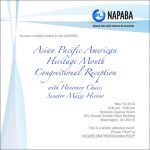May 27, 2014
WASHINGTON — The National Asian Pacific American Bar Association (NAPABA) acknowledges the suffering of WWII Comfort Women and other victims of human trafficking and opposes human trafficking in all of its forms.
In 2007, the U.S. House of Representatives passed House Resolution 121, which recognized that the Government of Japan, in the 1930’s through the end of World War II, forced women to provide sex to soldiers in its Imperial Armed Forces. The U.S. Department of State in its 2003 Japan Report referenced thousands of these victims of sexual slavery, commonly referred to as “Comfort Women,” who were kidnapped or coerced from countries including China, Indonesia, Japan, Korea, the Netherlands, and the Philippines.
Memorials in honor of Comfort Women have been erected in the U.S. and throughout the world. One such Comfort Women memorial was erected in July 2013 in Glendale, California, and a lawsuit, Gingery et al. v. City of Glendale, was filed earlier this year to force its removal, which caused controversy and spurred dialogue, particularly about differing Japanese and Korean viewpoints of the wartime and post-war treatment of Comfort Women.
“NAPABA members and affiliates across the country—including members of Korean American and Japanese American bar associations—have long worked together in multiethnic coalitions to support civil rights and justice for all of our communities,” said Bill Simonitsch, president of NAPABA. “I am heartened to see that the Asian Pacific American legal community refused to allow historical disagreements and the controversy over the Glendale memorial to divide us.”
NAPABA strongly condemns human trafficking, past and present, and supports fact-based measures to educate the public about Comfort Women and other victims of human trafficking.
###
The National Asian Pacific American Bar Association (NAPABA) is the national association of Asian Pacific American attorneys, judges, law professors, and law students. NAPABA represents the interests of over 40,000 attorneys and 68 state and local Asian Pacific American bar associations. Its members include solo practitioners, large firm lawyers, corporate counsel, legal service and non-profit attorneys, and lawyers serving at all levels of government. NAPABA continues to be a leader in addressing civil rights issues confronting Asian Pacific American communities. Through its national network of committees and affiliates, NAPABA provides a strong voice for increased diversity of the federal and state judiciaries, advocates for equal opportunity in the workplace, works to eliminate hate crimes and anti-immigrant sentiment, and promotes the professional development of people of color in the legal profession.




